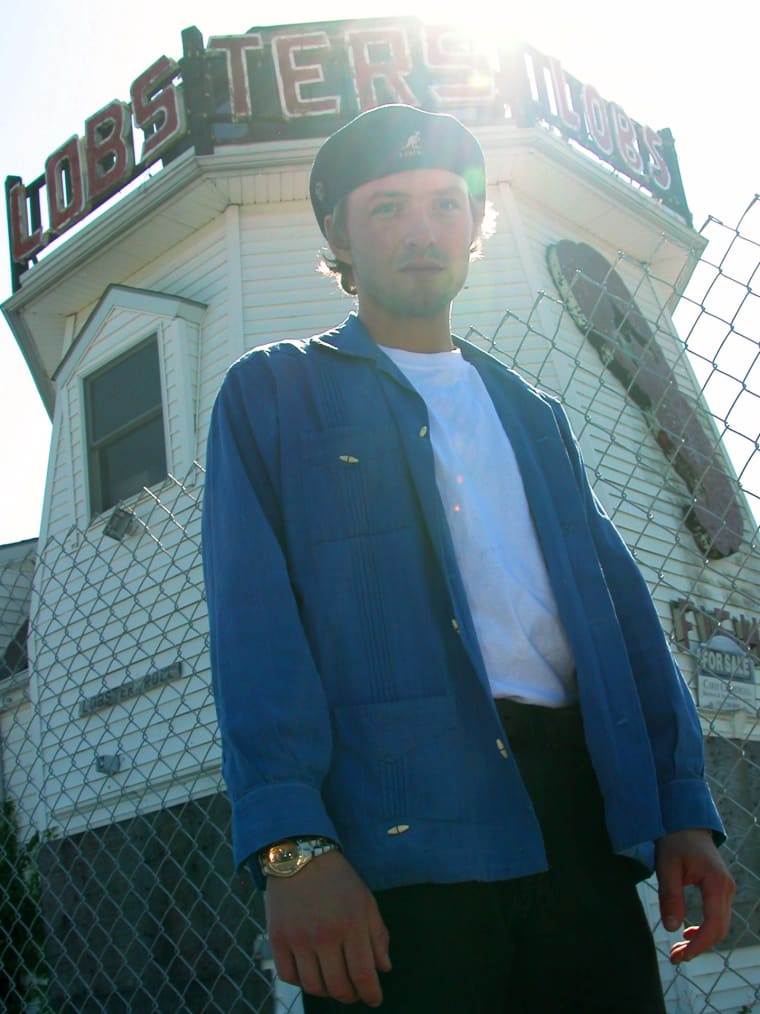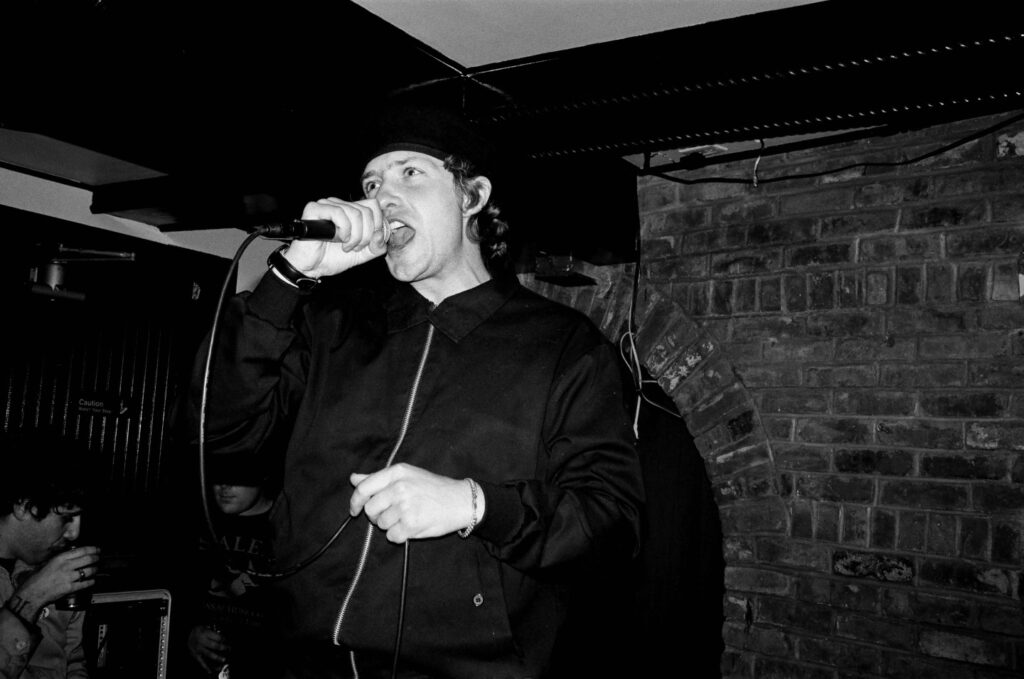
Cooper Handy, also known as LUCY, performs in the basement of New York City’s Grotta Azzurra. Photo by Sam Wachs.
Someone’s punching people in the basement. It’s the first thing I hear as I cross the threshold into Grotta Azzurra, a 126-year-old red sauce joint in the heart of Manhattan’s Little Italy. In recent years, the two-story space has been converted to accommodate private parties and the occasional show. It’s after midnight, and the downstairs stage — a 4’ X 4’ wooden plank raised on 2’ stilts — is locked in a UHaul with the keys inside.
It’s on this glorified soapbox that Cooper Handy, better known as the eccentric singer-producer LUCY, will later stand and deliver songs from his brand new album, Cooper B. Handy’s Album, Vol. 9. Opening band Test Subjects have been done for an hour, and the crowd is getting impatient enough to throw hands. Down the block, a lone municipal worker hangs Christmas lights.
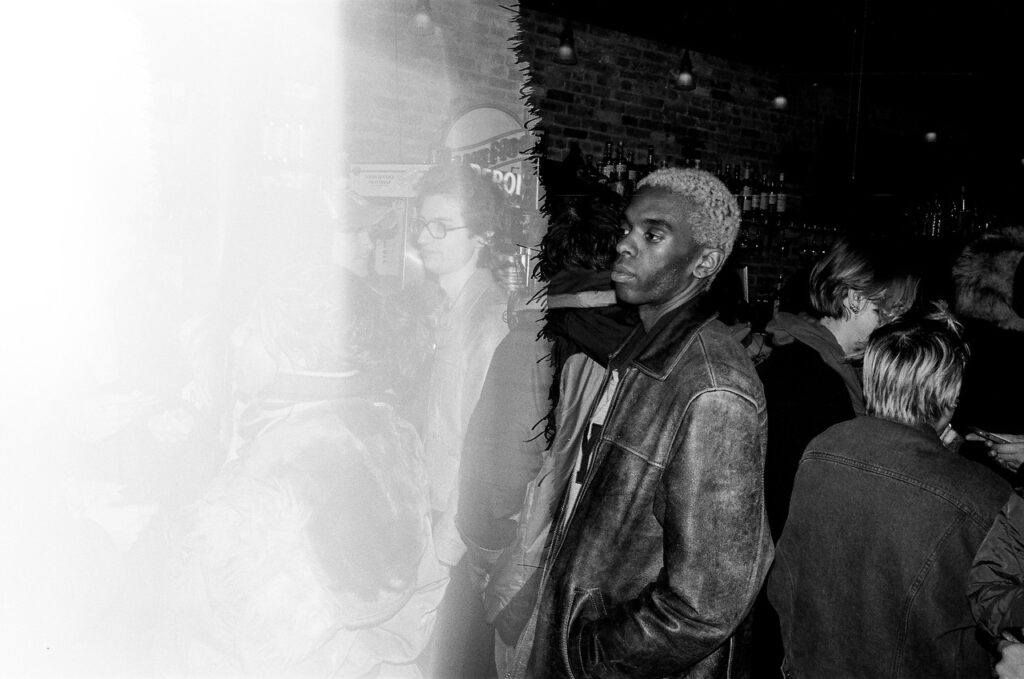
The upstairs crowd at Grotta Azzurra. Photo by Sam Wachs.
Upstairs, a throng of early 20-somethings congregate at an impressive backroom bar. There’s a slightly older and less dense crew up front, where I chat with Chicago legend DJ Manny as he sets up his decks (his set was scheduled to run concurrently with LUCY’s, but he goes on long before Handy sets foot on the basement stage.) He wasn’t familiar with LUCY before he was booked for the show, he tells me. But besides the regular crew of footwork faithful sipping cocktails by the front bar, nearly everyone is a LUCY fan, or at least is there with a LUCY fan, or at the very least is clout chasing in LUCY’s wake, whether they know it or not.
When I descend below ground, the violence has been replaced by a more orderly scrum of bodies oozing in and out of the slim hallway below the stairs. A coat rack sags beneath the weight 100 Carhartt jackets, with dozens more scattered like stranded Everest climbers at its feet. The heat, though not as bad as one might imagine, is oppressive, and no one looks comfortable.

The downstairs crowd at Grotta Azzurra. Photo by Sam Wachs.
By the time Handy starts performing, about half an hour late, the audience downstairs has thinned ever so slightly, making the danger of a crowd crush less clear and present. From the back of the room, I can only see Handy’s head and shoulders as he runs through CBHAV9 from front to back. It’s the first time I’ve ever seen him play a full project straight through, and I’ve been seeing him play for seven-odd years.
Two weeks earlier, between bites of a massive burrito at a Mexican restaurant in Northampton, MA, Handy dismisses the notion that he’s got a full-length project strong enough to tour behind. This bashfulness is typical; despite churning out consistently elite and uncompromisingly weird pop music for the past 10 years to growing acclaim, he’s as humble now — after performing with Boy Harsher at Primavera Los Angeles and opening multiple shows for King Krule during his 2023 U.S. tour — as he was when his only fans were a few weird white boys in Western Mass. When he receives a compliment, his pale skin glows red, highlighting his boyishly WASP-y good looks.
The conversation moves in fits and starts as we inhale our supersized wraps. We’re justifiably hungry, having just hiked the 935-foot Mount Holyoke in Hadley, a nearby town where Handy lived for most of his adult life, working as a dishwasher and catering courier at Amherst College until this year, when he finally achieved the minimum level of commercial success he needed to focus solely on music. Now, he lives in Northampton, a city of 30,000 permanent residents that’s a regional cultural center, even when its many institutions of higher learning close for the summer and winter.
Before our hike, we meet at Handy’s Easthampton studio space, a dimly lit room in a former paper mill that now stands next to a hulking weed dispensary. He splits it with a friend who’s been out of the recording game for a minute, so he generally has the space to himself, along with the equipment — an upright piano he mic’ed up for most of the live instrumentals on the new record, an electric bass, a MIDI keyboard, a PA and monitors, and a desk where he edits his tracks on a laptop. After dinner, it’s too late to get a good look at the house in Hadley where he spent his formative years living with members of Dark World, a since-dissolved underground rap crew and cult of personality revolving around its controversial leader, DJ Lucas.
Western Massachusetts has been Handy’s home since he graduated from high school 12 years ago. But he grew up on Cape Cod, the easternmost part of the state, in a small town from which boats ferry affluent out-of-staters to their summer homes on Martha’s Vineyard. Even now, he says, the Cape still feels more like home than the area where he’s spent his entire adulthood. He discusses this feeling on “Barking,” the closer and standout track from CBHAV9. “The sweet place I’m from, the same place I grew up in,” he sings, an uncharacteristic drawl slurring his vocals. “The same dogs that I know, yeah I swear I hear ’em barking.”
Then the hook: “Everyone I ever met lives inside of me.” It’s a line that’s been kicking around in his head since 2010, he tells me over the phone a few days after the album’s release. He’s on an Amtrak from New York to Northampton, returning from his long weekend in the city — from the chaotic Grotta Azzurra gig on Friday to a set with Club Casualties, his dance-pop duo with Nick Atkinson, in Ridgewood, Queens the following Tuesday. It rained the whole time.
The lyric came to him when he was 16, taking his brand new driver’s license for a spin in his ’96 Corolla (he’d trade it in for his current car, an ’04 Volvo station wagon, three years later). Have Moicy! — the unhinged 1976 folk masterpiece by Michael Hurley, the Unholy Modal Rounders, and Jeffrey Frederick & the Clamtones — was playing through the stereo; “Slurf Song” came on, pitting lewd digestive system jokes against heartwrenchingly beautiful bluegrass strings; Handy burst into tears.
Even today, he’s unsure how his own lyric connects to the Hurley track, or why its roots burrowed so deeply into his dendrites. You can hear a mangled version of the bar over a rough sample of the “Slurf Song” fiddles on one of LUCY’s earliest cuts, “Wisheys House.” The track begins with a lighter flick. “It’s 2014,” Handy monotones.
On “Barking,” the sample is employed to much more powerful effect. The song’s wistful, universal message — “that your memory of people is what you have of them,” Handy says — is tearjerking on its own, but especially so when delivered over Hurley’s strings. Even adding the incongruous but somehow-perfect trap drums that undergird the instrumental, it’s a cry-in-the-car song to beat the band. Still, he pays homage to his younger, greener self by opening the song in the same diaristic fashion as its primitive predecessor: “It’s 2024.”
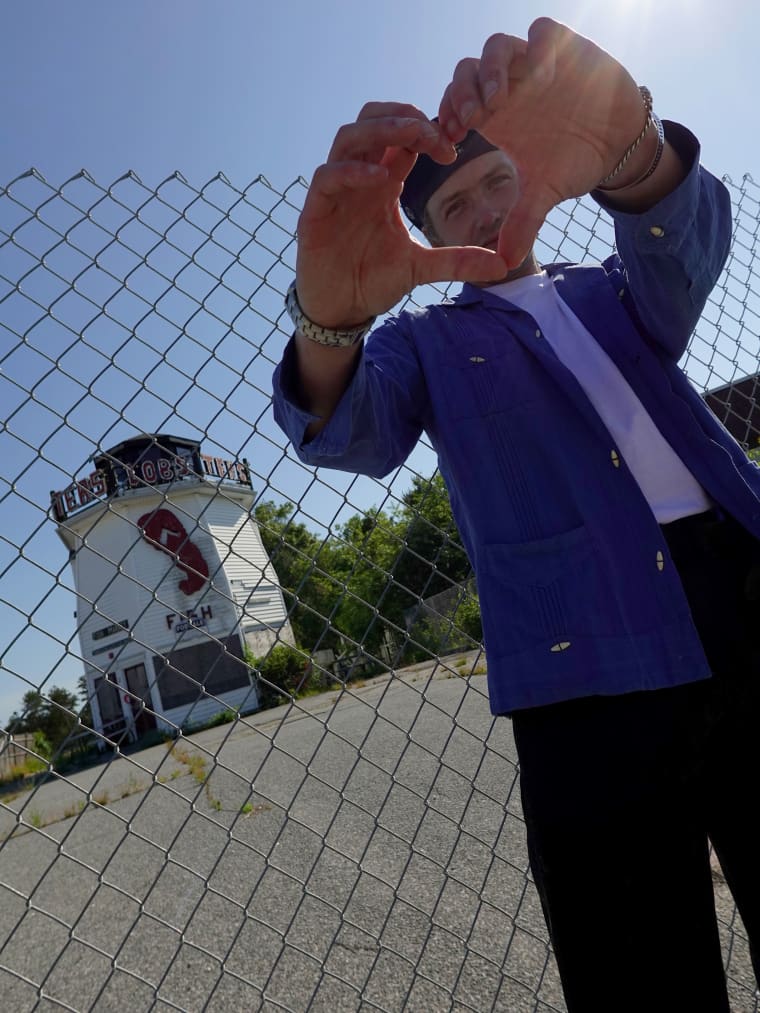
Cooper Handy is a creature of habit. He summits Mount Holyoke at least twice a week, and on the off days, he still strives to get a solid hour of walking in. “It helps with the music in a serious way,” he says. “If I don’t get exercise before I go to the studio, I’m less able to work. I feel like my body is wanting me to do more.” His recording process is essentially the same as it was when he was 20, aside from a few upgrades. He still produces his songs on GarageBand, though he rarely uses the program’s default instruments these days, and he’s learned to quantize his beats into a rhythmic grid — a proficiency that’s notably absent on fledgling recordings like “Wisheys House.”
The campy charm that comes with his use of basic software is thrown into stark relief against the mastery of both live instruments and samples he’s achieved over the years. Still, it threads a quirky through line from his first-ever project, 2014’s cheekily titled Best Of, all the way to CBHAV9. His sound has always lived on the border of irony and deep sincerity — and his Dark World beginnings have led many unlightened listeners to situate him in the former camp — but he takes his music seriously. Over burritos, he complains that people too often compare him to Jonathan Richman, Massachusetts’s kook-rock overlord.
“I definitely like him, but sometimes I think his solo career is a little too silly,” Handy says. “I enjoy seeing him live, but I don’t feel like I get that silly or weird [in my own shows]. There’s something about his sets that lack a certain darkness, and I feel like he’s always striving to keep it that way. I know sometimes people find my music funny, but it’s different than his.” There’s no shade, of course. “He’s one of the few Massachusetts guys that did something cool, and I admire the almost stream-of-consciousness flows he uses,” Handy clarifies.
Handy’s struggle with the perception of his work as unserious is a quietly existential one. His music exists in its own world, ultra-specific but always shapeshifting, and he lives there with it, unwilling or simply unable to concede any of its territory to the invading forces of critical and commercial concerns. It’s part of what makes him such a special artist at a time when so many great talents are made to contort their souls for cynical social content.
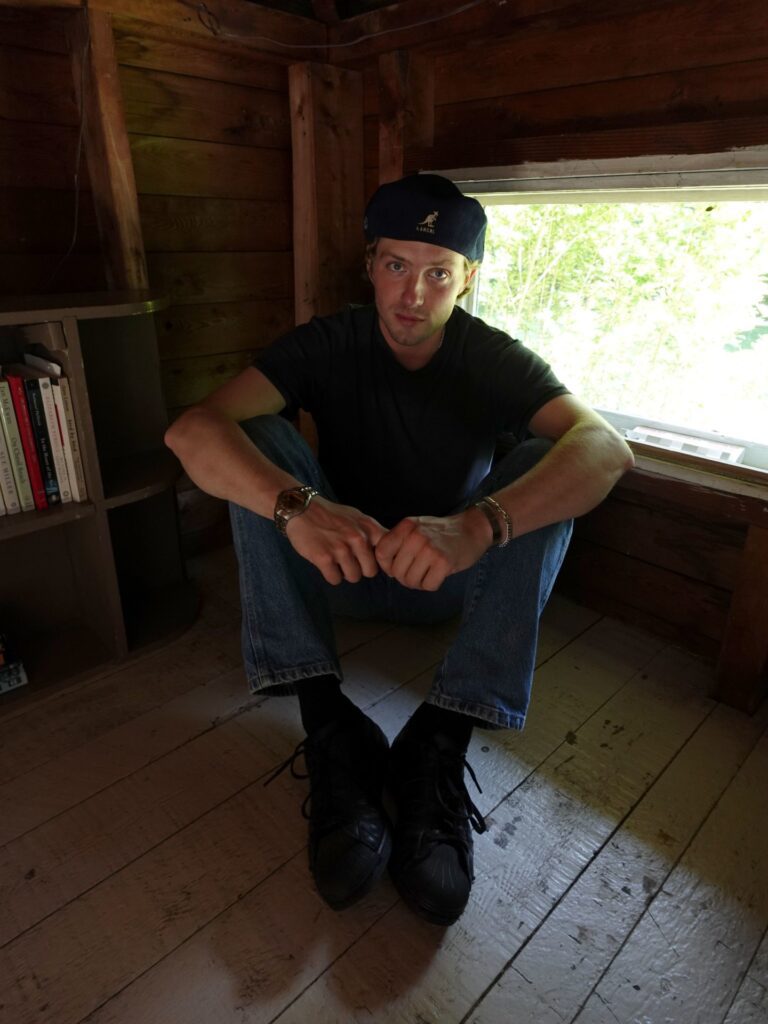
Photo by Guy Kozak.
Handy released V9 — just as he released the first eight Cooper B. Handy’s albums and most every other project he’s been a part of — independently and on his own schedule. He tried the label route once, for his ironically named 2020 project The Music Industry Is Poisonous, and was both anxious about having other hands mix and master his tracks and frustrated with the waiting around that’s part and parcel of a traditional album rollout. He’s open to trying it again but wary of falling into the same trap.
His refusal to work on anyone else’s terms hasn’t gotten in the way of his prolific career as a collaborator. He’s been playing in a post-punk duo called Taxidermists with his close friend Salvadore McNamara since middle school; he dropped a joint project with his fellow former Dark Worlder and kindred spirit Gods Wisdom in 2022; and he and Atkinson released their second Club Casualties album last fall. In 2024, he’s let others take the production reins, resulting in two excellent records: January’s 100% Prod I.V. is, as its title suggests, produced by a Minneapolis-based artist named for a medical feeding tube, whom Handy discovered when she started emailing him “harpsichord trap” beats (his words) months earlier. (They’ve got plenty more tracks in the vault, he says — at least enough for another full-length release.) And June’s Jack & the Beanstalk is a product of his collegial creative partnership with in-demand Surf Gang producers EvilGiane and Harrison.
In 2025, he’ll share a new Taxidermists album and a project with Boy Harsher’s Gus Miller (as Safe Mind) — and that’s just what’s been announced so far.
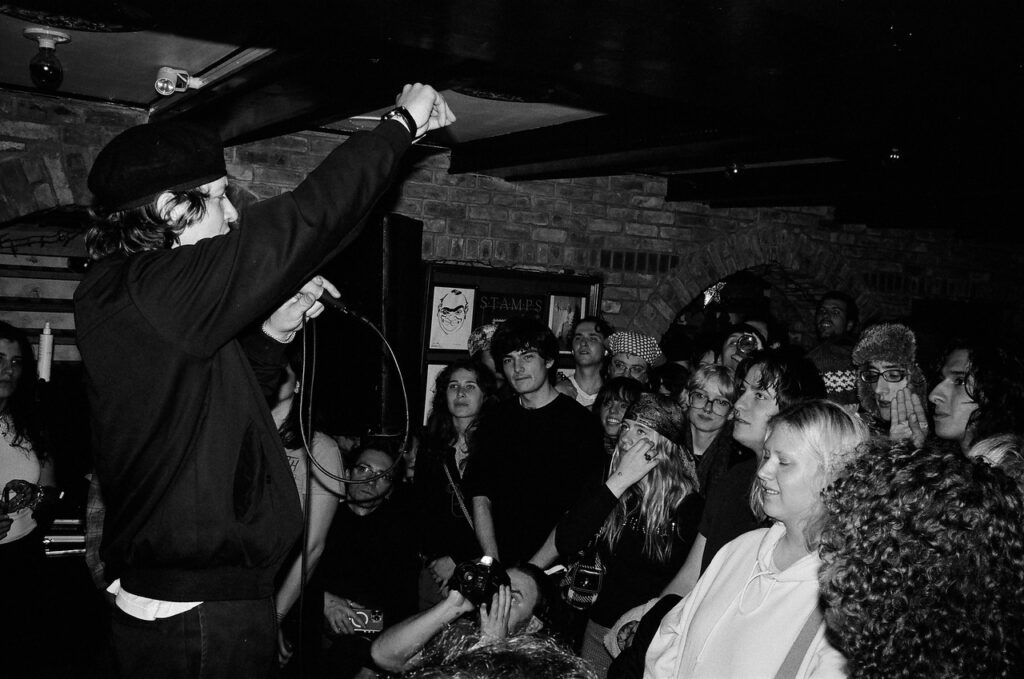
LUCY in the Grotta Azzurra basement. Photo by Sam Wachs.
Still, Handy shines brightest on his own, and V9 is a significant evolution in his solo career. At 17 songs, it’s his longest release by a mile. And despite its mixtape feel, there’s little filler on its tracklist. It encapsulates nearly every aspect of his odd ethos, mixing classic LUCY piano tracks and brazen flips — Guns N’ Roses’ “Sweet Child O’ Mine” and Céline Dion’s “My Heart Will Go On” are the boldest — that exist beyond considerations of clearance and sample snitching.
On “Rhododendron,” he pairs the melodramatic pan-flute melody of Dion’s Titanic theme with an elementary 808 drum line. As on “Barking,” the jarringly goofy combination is, inexplicably, the ideal setting for some of the most powerful lyrics on the album. “We go to the garden / We see that it’s frozen / Cut up rhododendron / For the time that we’re spending,” he sings. “Oh no / The winds of change will blow / A new tale, but they say it’s been told.”
“Are we holding on to let go?” he finishes, letting the question hang in the air unanswered. The song’s central metaphor is straightforward on its face; the rhododendron, a woody plant that overflows with vividly colored flowers in the spring and summer in Handy’s native New England, symbolizes eternal impermanence. But it’s not as simple as that. “You know how rhododendrons look different in winter?” he asks me, watching rain slide down the window of his northbound train. “The leaves curl up into tubes, but they keep their color.
“It’s something I’ve noticed since I was a kid,” he says. “They don’t die, but they always change shape.”


